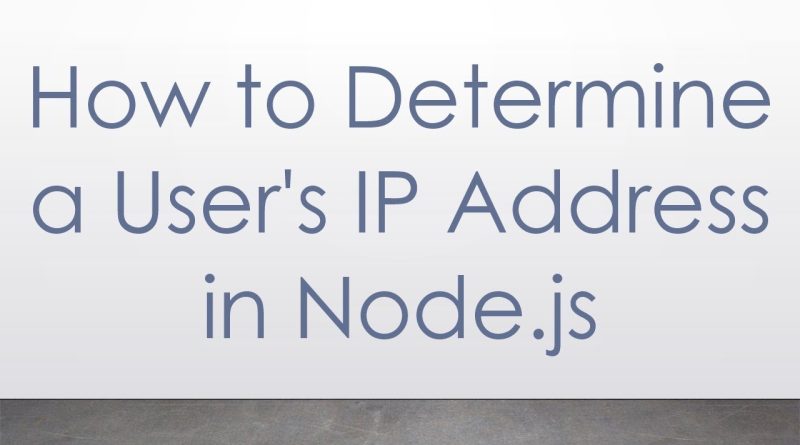How to Determine a User's IP Address in Node.js
Disclaimer/Disclosure: Some of the content was synthetically produced using various Generative AI (artificial intelligence) tools; so, there may be inaccuracies or misleading information present in the video. Please consider this before relying on the content to make any decisions or take any actions etc. If you still have any concerns, please feel free to write them in a comment. Thank you.
—
Summary: Learn how to determine a user’s IP address in a Node.js application using different methods, including the request object in HTTP and third-party libraries. This guide provides code examples and explanations to help you get started.
—
In a Node.js application, determining a user’s IP address can be crucial for various reasons such as logging, analytics, security measures, and geolocation services. This guide will walk you through several methods to achieve this, including using the request object in HTTP and leveraging third-party libraries.
Using the Request Object in HTTP
The most straightforward way to get a user’s IP address is by extracting it from the HTTP request object. Here’s how you can do it:
Basic HTTP Server Example
If you are using the built-in http module to create your server, you can access the IP address directly from the request object:
[[See Video to Reveal this Text or Code Snippet]]
Express Framework Example
If you are using the Express framework, the process is similar but slightly simplified:
[[See Video to Reveal this Text or Code Snippet]]
Handling Proxies and Load Balancers
In many production environments, your Node.js application might be behind a proxy or load balancer. In such cases, the IP address obtained from req.socket.remoteAddress or req.ip might not be the user’s actual IP address. Instead, it could be the IP address of the proxy server. To handle this, you can use the X-Forwarded-For HTTP header.
Express with Proxy Headers
To correctly handle proxies, you should enable the trust proxy setting in Express:
[[See Video to Reveal this Text or Code Snippet]]
Extracting IP Address from Headers Manually
If you’re not using Express or want to manually extract the IP address, you can do so as follows:
[[See Video to Reveal this Text or Code Snippet]]
Using Third-Party Libraries
For more advanced scenarios, you might prefer using third-party libraries that simplify the process of retrieving the user’s IP address. One such popular library is request-ip.
Using request-ip Library
First, install the library:
[[See Video to Reveal this Text or Code Snippet]]
Then, use it in your application:
[[See Video to Reveal this Text or Code Snippet]]
Conclusion
Determining a user’s IP address in a Node.js application can be done in various ways, depending on your setup and requirements. Using the request object directly works for simple cases, while handling proxy headers or leveraging third-party libraries can provide more robust solutions for complex environments. Choose the method that best fits your needs and ensure you handle IP addresses securely and responsibly.
ip address



